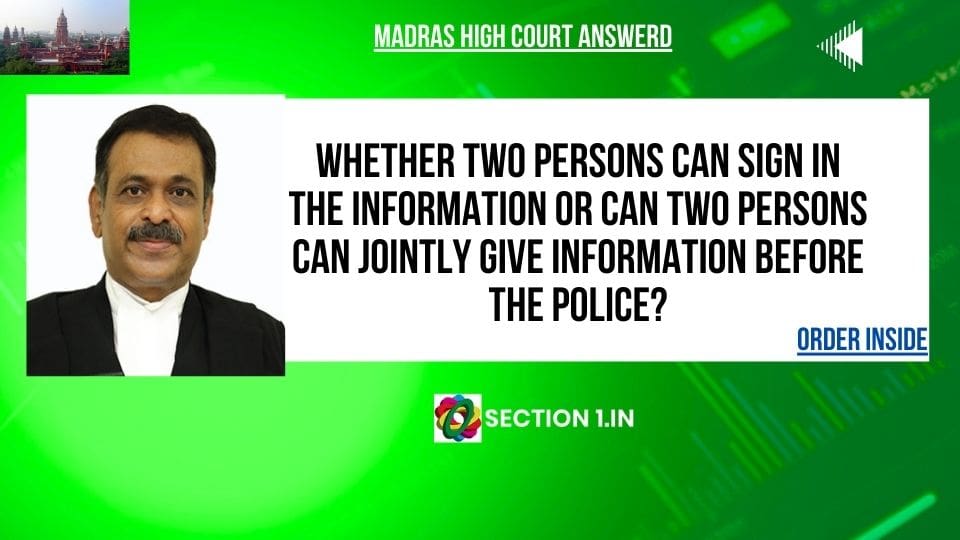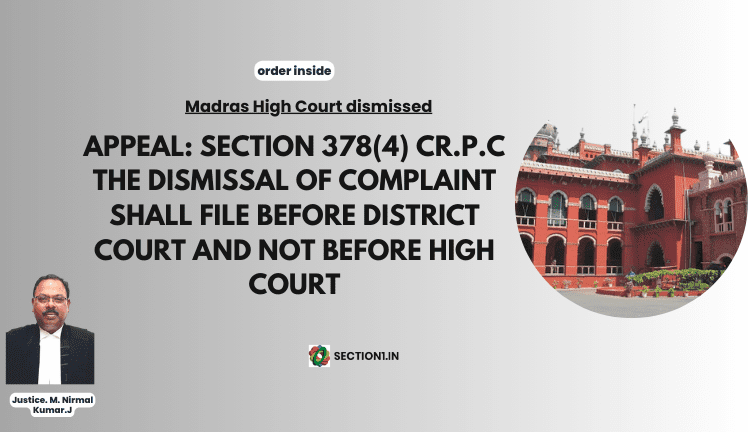QUASH PETITION
2. Learned senior counsel for the petitioner challenged the final report in C.C.No.33 of 2022 on a only ground that the complaint/information, on the basis of which first information report in Crime No. 766 of 2006 for the offences under Sections 120(b), 419, 420, 465, 467, 468 and 471 of IPC came to be registered, was signed by two persons, namely, Sarathkakumanu and K.Beena. The complaint/ information can be only given by only one person and not by two persons and if more than one person joined and gave the complaint, it is impermissible under law and the proceedings initiated on the basis of such complaint/information is illegal and liable to be set aside. In support of his submission, learned senior counsel for the petitioner pressed to service the following judgments reported in:-
1. 1931 SCC OnLine Cal 34: AIR 1931 Cal 646: 1932 Cri LJ 83 (Sashadhar Acharjya and another Versus Sir Charles Tegart and others);
2. MANU/TN/6105/2006 (Thethavusamy versus Radhakrishnan);
3. CDJ 2010 MHC 1043 (Swami @ Ramakrishnan Versus State by Inspector of Police, G2 Puthumanthu Police Station, Nilgiris District);
4. CDJ 2011 MHC 2973 (Maheswari & Others Versus Jayanthi & Another);xxx
GROUND TAKEN
5. Except the ground raised by the learned senior counsel for the petitioner that the complaint/information signed by two persons is not maintainable and registration of the first information report, conduct of the investigation and filing of a final report in furtherance of that complaint is also illegal and therefore, the proceedings is liable to be quashed, no other ground is taken in this petition.
6. Perusal of the records shows that on the basis of the complaint by one Sarathkakumanu and K.Beena, in the capacity of Directors of Hotel Snow White Private Limited and 17 other companies, making allegations of land grabbing with the use of forged power of attorney, the first information report in Crime No.766 of 2006 for offences under Sections 120(b), 419, 420, 465, 467, 468 & 471 of IPC came to be registered. After investigation, respondent police filed final report for the offences under Sections 120(B), 419, 420, 465, 467, 468 & 471 r/w.34 of IPC and the offences were taken cognizance in C.C.No.33 of 2022 and it is pending.
After considering the judgments (cited supra) relied on by the petitioner the Hon’ble Madras High Court has held as follows:
8. On the consideration of the judgments relied by the learned counsel appearing for the petitioner, it is clear that no case was quashed for the reason that the case instituted on the basis of a police report cannot be maintained for the reason that the complaint/first information was signed by two informants/complainants.
PROCEDURE MAGISTRATE HAS TO FOLLOW IN COMPLAINT CASES
9. The case instituted otherwise than on police report commences with the complaint given by the complainant under chapter XV of Cr.P.C, especially under section 200 Cr.P.C. Once a complaint is given, the Magistrate shall have to examine upon oath the complainant and the witnesses present and reduce into writing. If a public servant acting or purporting to act in the discharge of official duty or a Court has made a complaint or if the Magistrate makes over the case for an enquiry or trial to another Magistrate under section 192 Cr.P.C, it is not necessary to examine the complainant and witnesses. The Magistrate is required to conduct an enquiry or investigation by a police officer in some cases under section 202 Cr.P.C. After considering the statements on oath of the complainant and the witnesses and the result of the enquiry / investigation under section 202 Cr.P.C, if the Magistrate is of the opinion that there is no ground for proceeding, he shall dismiss the complaint with reasons under section 202 Cr.P.C. If the Magistrate is of the opinion that there is sufficient ground for proceeding, then he can take cognizance of the offence and issue summons/warrant, as the case may be.
PROCEDURE AFTER TAKING COGNIZANCE
10. Reading of these sections make it clear, the complainant has to make out a sufficient ground for proceeding for taking cognizance of an offence in a private complaint case. After taking cognizance and after the appearance of the accused, the proceeding commences by following the provisions under sections 244 to 247 of Cr.P.C under Chapter – XIX. In case of warrant cases, the complainant has to produce evidence in support of his case. If the Magistrate considers that no case is made out against the accused from the evidence, the learned Magistrate shall discharge the accused under section 245(1) Cr.P.C. Even before this stage, the Magistrate can discharge the accused if he considers the charge to be groundless under section 245(2) Cr.P.C. 11. If the Magistrate does not discharge the accused and is of the opinion that there is a ground for presuming that the accused committed an offence, then he shall frame charge/charges against the accused under section 246(1) Cr.P.C. If the accused claims to be tried and he wishes to cross-examine any of the witnesses whose evidences had been taken, those witnesses shall be recalled for the purpose of cross examination and re-examination under sections 246(4) and 246(5) Cr.P.C.. Then, the evidence of remaining witnesses for prosecution has to be taken under section 246(6) Cr.P.C. Thereafter, accused shall be called upon to enter/give his evidence and produce his evidence under section 247 Cr.P.C.
PROCEDURE ON POLICE REPORT
12. On the other hand, in a case instituted on a police report, it starts with an information given to the police in a cognizable offence under section 154 Cr.P.C. If an information in a cognizable offence case is given in writing, substance of the information shall have to be entered in a book to be kept by the officer in-charge of the police station, namely, first information report register. Thereafter, the police officer has the power to investigate the cognizable offence. The procedure for investigation and filing of report on the completion of investigation are dealt under Sections 157 and 173 Cr.P.C. Information to police and their powers to investigate are dealt under Chapter – XII from Sections 154 to 176 Cr.P.C. Thereafter, the Magistrate takes cognizance of the offences upon the police report under section 190 Cr.P.C. Once the cognizance is taken, summons/warrant, as the case may be, issued to the accused. The trial proceedings are governed by Sections 238 to 242 Cr.P.C in case of cases instituted on a police report in warrant cases and under sections 251 to 259 Cr.P.C in case of summons cases.
13. So far as warrant cases are concerned, after compliance of provisions under section 207 Cr.P.C, upon considering the police report and the documents sent under section 173 Cr.P.C., and making such examination if any, if the Magistrate thinks necessary and after giving the prosecution and accused an opportunity of being heard, the Magistrate can discharge the accused if the charge against the accused is groundless, giving reasons under section 239 Cr.P.C. If upon such consideration and examination, if any, and hearing, if the Magistrate is of the opinion that there is ground for presuming that the accused has committed an offence triable under the Chapter, he shall frame charge in writing against the accused. If the accused claims to be tried, then the evidence for prosecution to be taken followed by evidence for defence under sections 242 under 243 Cr.P.C.
14. The analysis of these provisions abundantly made it clear that starting from the initiation of the proceedings, for a case instituted on a police report and a case instituted otherwise than on a police report, different procedures are contemplated. In a case instituted on a police report, once the information in cognizance offence is received and entered in the first information report register, then the officer concerned with the particular police station takes up the investigation and then it is the duty and responsibility of the State to prosecute the accused. On the other hand, in a case instituted otherwise than on a police report, starting from the giving of the complaint till the completion of the trial, it is for the complainant to take steps to take the case forward to the next level.
15. The judgments relied by the learned counsel appearing for petitioner came to be delivered in a case instituted otherwise than on police report or on the basis of the decision taken in a case instituted otherwise than on a police report. Therefore none of the decisions are useful to the case of the petitioner. Though two persons have signed in the complaint / information in a case instituted on a police report, now trial is in progress, reached its final stage, the prayer for quashing C.C.No.33 of 2022 on the file of the learned Special Metropolitan Magistrate-II for the Exclusive Trial of Land Grabbing Cases, Allikulam, Chennai, cannot be entertained.
PARTY: Gita vs. The State represented by The Inspector of Police Central Crime Branch, Team – XVII Anti Land Grabbing Special Cell-1 Vepery, Chennai – 600 007 – Crl.O.P.No: 1230 of 2023 and Crl.M.P.No: 653 and 654 of 2023 – 30.03.2023
https://www.mhc.tn.gov.in/judis/index.php/casestatus/viewpdf/1035291






